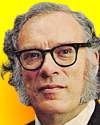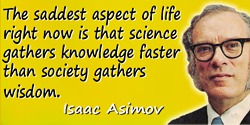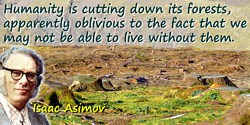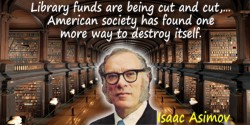 (source)
(source)
|
Isaac Asimov
(2 Jan 1920 - 6 Apr 1992)
Russian-American writer and biochemist who was a prolific author and editor of science fiction and non-fiction.
|
Isaac Asimov Quotes on Knowledge (17 quotes)
>> Click for 265 Science Quotes by Isaac Asimov
>> Click for Isaac Asimov Quotes on | Belief | Biography | Creationist | Death | Fear | Ignorance | Life | Science | Scientist | Solution | Theory | Understanding | Universe |
>> Click for 265 Science Quotes by Isaac Asimov
>> Click for Isaac Asimov Quotes on | Belief | Biography | Creationist | Death | Fear | Ignorance | Life | Science | Scientist | Solution | Theory | Understanding | Universe |
Any increase in knowledge anywhere helps pave the way for an increase in knowledge everywhere.
— Isaac Asimov
Epigraph in Isaac Asimov’s Book of Science and Nature Quotations (1988), 243.
During the century after Newton, it was still possible for a man of unusual attainments to master all fields of scientific knowledge. But by 1800, this had become entirely impracticable.
— Isaac Asimov
The Intelligent Man's Guide to Science (1960), 19.
Experimentation is the least arrogant method of gaining knowledge. The experimenter humbly asks a question of nature.
— Isaac Asimov
[Unverified. Please contact Webmaster if you can identify the primary source.]
I am an atheist, out and out. It took me a long time to say it. I’ve been an atheist for years and years, but somehow I felt it was intellectually unrespectable to say one was an atheist, because it assumed knowledge that one didn't have. Somehow, it was better to say one was a humanist or an agnostic. I finally decided that I’m a creature of emotion as well as of reason. Emotionally, I am an atheist. I don't have the evidence to prove that God doesn’t exist, but I so strongly suspect he doesn’t that I don’t want to waste my time.
— Isaac Asimov
'Isaac Asimov on Science and the Bible'. In Sidney Hook, et. al. On the Barricades: Religion and Free Inquiry in Conflict (1989), 329.
I could almost wish, at this point, that I were in the habit of expressing myself in theological terms, for if I were, I might be able to compress my entire thesis into a sentence. All knowledge of every variety (I might say) is in the mind of God—and the human intellect, even the best, in trying to pluck it forth can but “see through a glass, darkly.”
— Isaac Asimov
In Asimov on Physics (1976), 146. Also in Isaac Asimov’s Book of Science and Nature Quotations (1988), 279.
I’m sure that science can’t ever explain everything and I can give you the reasons for that decision … I believe that scientific knowledge has fractal properties; that no matter how much we learn, whatever is left, however small it may seem, is just as infinitely complex as the whole was to start with. That, I think is the secret of the universe.
— Isaac Asimov
In It’s Been a Good Life (2009), 258, cited as from I. Asimov: A Memoir (1994), 481.
Knowledge is indivisible. When people grow wise in one direction, they are sure to make it easier for themselves to grow wise in other directions as well. On the other hand, when they split up knowledge, concentrate on their own field, and scorn and ignore other fields, they grow less wise–even in their own field.
— Isaac Asimov
In The Roving Mind (1983), 116.
Science doesn’t purvey absolute truth. Science is a mechanism, a way of trying to improve your knowledge of nature. It’s a system for testing your thoughts against the universe, and seeing whether they match.
— Isaac Asimov
'Isaac Asimov Speaks' with Bill Moyers in The Humanist (Jan/Feb 1989), 49. Reprinted in Carl Howard Freedman (ed.), Conversations with Isaac Asimov (2005), 143-144. Bill Moyers asked “What’s real knowledge?” Asimov replied, “Well, we can’t be absolutely certain.” He continued answering as in the quote above.
Scientific apparatus offers a window to knowledge, but as they grow more elaborate, scientists spend ever more time washing the windows.
— Isaac Asimov
[Unverified. Please contact Webmaster if you can identify the primary source.]
Suppose that we are wise enough to learn and know—and yet not wise enough to control our learning and knowledge, so that we use it to destroy ourselves? Even if that is so, knowledge remains better than ignorance. It is better to know—even if the knowledge endures only for the moment that comes before destruction—than to gain eternal life at the price of a dull and swinish lack of comprehension of a universe that swirls unseen before us in all its wonder. That was the choice of Achilles, and it is mine, too.
— Isaac Asimov
Widely seen on the Web, but always without citation, so regard attribution as uncertain. Webmaster has not yet found reliable verification. Contact Webmaster if you know a primary print source.
The saddest aspect of life right now is that science gathers knowledge faster than society gathers wisdom.
— Isaac Asimov
IIsaac Asimov's Book of Science and Nature Quotations (1988), 281.
The true delight is in the finding out rather than in the knowing.
— Isaac Asimov
Quoted, without citation, in Journal of Nuclear Medicine Technology (1997), 25, 4. Various other instances of the quote published later also show no citation. Please contact Webmaster if you know a primary print source.
The young specialist in English Lit, having quoted me, went on to lecture me severely on the fact that in every century people have thought they understood the Universe at last, and in every century they were proved to be wrong. It follows that the one thing we can say about our modern “knowledge” is that it is wrong.
The young man then quoted with approval what Socrates had said on learning that the Delphic oracle had proclaimed him the wisest man in Greece. “If I am the wisest man,” said Socrates, “it is because I alone know that I know nothing.” The implication was that I was very foolish because I was under the impression I knew a great deal.
Alas, none of this was new to me. (There is very little that is new to me; I wish my correspondents would realize this.) This particular theme was addressed to me a quarter of a century ago by John Campbell, who specialized in irritating me. He also told me that all theories are proven wrong in time.
My answer to him was, “John, when people thought the Earth was flat, they were wrong. When people thought the Earth was spherical, they were wrong. But if you think that thinking the Earth is spherical is just as wrong as thinking the Earth is flat, then your view is wronger than both of them put together.”
The young man then quoted with approval what Socrates had said on learning that the Delphic oracle had proclaimed him the wisest man in Greece. “If I am the wisest man,” said Socrates, “it is because I alone know that I know nothing.” The implication was that I was very foolish because I was under the impression I knew a great deal.
Alas, none of this was new to me. (There is very little that is new to me; I wish my correspondents would realize this.) This particular theme was addressed to me a quarter of a century ago by John Campbell, who specialized in irritating me. He also told me that all theories are proven wrong in time.
My answer to him was, “John, when people thought the Earth was flat, they were wrong. When people thought the Earth was spherical, they were wrong. But if you think that thinking the Earth is spherical is just as wrong as thinking the Earth is flat, then your view is wronger than both of them put together.”
— Isaac Asimov
In The Relativity of Wrong (1989), 214.
There is a cult of ignorance in the United States, and there has always been. The strain of anti-intellectualism has been a constant thread winding its way through our political and cultural life, nurtured by the false notion that democracy means that “my ignorance is just as good as your knowledge.”
— Isaac Asimov
In 'A Cult of Ignorance', Newsweek (21 Jan 1980), 19. As cited in Igor Ž. Žagar and Polona Kelava, From Formal to Non-Formal: Education, Learning and Knowledge (2014), 74.
To test a perfect theory with imperfect instruments did not impress the Greek philosophers as a valid way to gain knowledge.
— Isaac Asimov
The New Intelligent Man's Guide to Science (1965), Vol. 1, 12.
Unfortunately, in many cases, people who write science fiction violate the laws of nature, not because they want to make a point, but because they don't know what the laws of nature are.
— Isaac Asimov
In Carl Howard Freedman (ed.), Conversations with Isaac Asimov (2005), back cover.
While knowledge can create problems, it is not through ignorance that we can solve them.
— Isaac Asimov
In Asimov's New Guide to Science (1984), 15.
See also:
- 2 Jan - short biography, births, deaths and events on date of Asimov's birth.
- Isaac Asimov - context of quote “It’s the bees and the flowers.” - Medium image (500 x 250 px)
- Isaac Asimov - context of quote “It’s the bees and the flowers.” - Large image (800 x 400 px)
- Asimov's Chronology of Science and Discovery, by Isaac Asimov. - book suggestion.
- Booklist for Isaac Asimov.



 In science it often happens that scientists say, 'You know that's a really good argument; my position is mistaken,' and then they would actually change their minds and you never hear that old view from them again. They really do it. It doesn't happen as often as it should, because scientists are human and change is sometimes painful. But it happens every day. I cannot recall the last time something like that happened in politics or religion.
(1987) --
In science it often happens that scientists say, 'You know that's a really good argument; my position is mistaken,' and then they would actually change their minds and you never hear that old view from them again. They really do it. It doesn't happen as often as it should, because scientists are human and change is sometimes painful. But it happens every day. I cannot recall the last time something like that happened in politics or religion.
(1987) -- 


